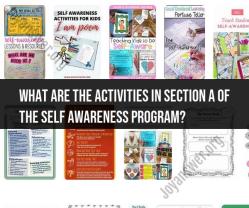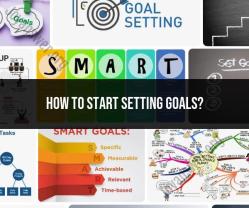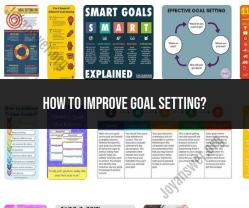How to stop feeling disappointed about yourself?
Feeling disappointed in oneself is a common experience, but it's important to address these feelings constructively in order to foster personal growth and self-improvement. Here are some strategies to help you stop feeling disappointed about yourself:
Practice Self-Compassion:
- Treat yourself with the same kindness and understanding that you would offer to a friend. Remember that everyone makes mistakes and faces setbacks.
Set Realistic Expectations:
- Sometimes, disappointment arises from setting unrealistic or overly high expectations for yourself. Consider whether your expectations are achievable and adjust them if necessary.
Focus on the Positive:
- Shift your focus from what you haven't achieved to what you have accomplished. Celebrate your successes, no matter how small they may seem.
Learn from Mistakes:
- Instead of dwelling on your failures, view them as opportunities for growth and learning. Analyze what went wrong and how you can improve in the future.
Practice Mindfulness:
- Mindfulness techniques can help you stay present in the moment and reduce self-critical thoughts. Meditation and deep breathing exercises can be effective tools.
Challenge Negative Self-Talk:
- Pay attention to the negative thoughts you have about yourself and challenge them. Replace self-criticism with more balanced and positive self-talk.
Seek Support:
- Talk to friends, family members, or a therapist about your feelings of disappointment. Sharing your thoughts and emotions can provide valuable perspective and support.
Set Achievable Goals:
- Break down your larger goals into smaller, manageable steps. Achieving these smaller milestones can boost your confidence and reduce disappointment.
Embrace Growth Mindset:
- Adopt a growth mindset, which means believing that your abilities and intelligence can be developed over time with effort and practice. This can lead to a more positive outlook on personal growth.
Practice Self-Care:
- Take care of your physical and emotional well-being. Engage in activities that make you feel good and reduce stress.
Forgive Yourself:
- Recognize that being human means making mistakes. Forgive yourself for past shortcomings and focus on moving forward.
Set Boundaries:
- Establish healthy boundaries in your life to prevent burnout and overcommitting. It's okay to say no when necessary.
Seek Professional Help:
- If your feelings of self-disappointment are overwhelming or persistent, consider seeking the assistance of a therapist or counselor who specializes in self-esteem and personal growth.
Remember that overcoming self-disappointment is an ongoing process, and it's normal to have moments of self-doubt. Be patient with yourself and keep working on building a healthier, more positive self-image. Growth and self-improvement often come from learning to navigate and grow through these challenging emotions.
Overcoming Self-Disappointment: Strategies for a Positive Self-Image
Self-disappointment is a common emotion that can be caused by a variety of factors, such as failing to meet expectations, making a mistake, or experiencing a setback. While self-disappointment can be unpleasant, it is important to remember that it is a normal human emotion.
Here are some strategies for overcoming self-disappointment and developing a more positive self-image:
- Acknowledge your feelings: The first step to overcoming self-disappointment is to acknowledge your feelings. Allow yourself to feel disappointed, but don't dwell on your negative emotions.
- Identify the cause of your disappointment: Once you have acknowledged your feelings, try to identify the cause of your disappointment. This will help you to understand what you can do to prevent similar experiences in the future.
- Be realistic about your expectations: It is important to have realistic expectations of yourself and others. If you set your expectations too high, you are more likely to experience disappointment.
- Focus on your strengths: Everyone has strengths and weaknesses. When you feel disappointed in yourself, focus on your strengths and accomplishments. This will help you to build your self-esteem and confidence.
- Learn from your mistakes: Everyone makes mistakes. When you make a mistake, don't beat yourself up about it. Instead, learn from your mistake and move on.
- Be kind to yourself: Be kind and compassionate towards yourself, even when you make mistakes. Talk to yourself the way that you would talk to a friend.
Building Self-Esteem and Confidence: How to Stop Feeling Disappointed in Yourself
Self-esteem is your overall opinion of yourself, while confidence is your belief in your abilities. Building self-esteem and confidence can help you to overcome self-disappointment.
Here are some tips for building self-esteem and confidence:
- Challenge negative thoughts: When you have a negative thought about yourself, challenge it. Ask yourself if there is any evidence to support the thought. If not, replace the negative thought with a more positive one.
- Set realistic goals: Set realistic and achievable goals for yourself. When you achieve a goal, celebrate your accomplishment. This will help you to build your self-confidence.
- Surround yourself with positive people: Spend time with people who make you feel good about yourself. Avoid people who are critical or negative.
- Take care of yourself: Make sure to take care of your physical and mental health. Eat healthy foods, get regular exercise, and get enough sleep. When you take care of yourself, you feel better about yourself.
Transforming Self-Criticism into Self-Compassion: A Guide to Self-Improvement
Self-criticism is the negative inner voice that tells us that we are not good enough. It can be difficult to overcome self-criticism, but it is possible.
One way to overcome self-criticism is to transform it into self-compassion. Self-compassion is the ability to be kind and understanding towards ourselves, even when we make mistakes.
Here are some tips for transforming self-criticism into self-compassion:
- Acknowledge your self-criticism: The first step to transforming self-criticism is to acknowledge it. Pay attention to the negative thoughts that you have about yourself.
- Be kind to yourself: When you have a negative thought about yourself, be kind to yourself. Talk to yourself the way that you would talk to a friend.
- Identify the root cause of your self-criticism: Try to identify the root cause of your self-criticism. Once you understand the root cause, you can start to address it.
- Practice self-forgiveness: Everyone makes mistakes. When you make a mistake, forgive yourself. Don't dwell on your mistakes.
- Focus on your strengths: Focus on your strengths and accomplishments. This will help you to build your self-esteem and confidence.
By following these tips, you can overcome self-disappointment and develop a more positive self-image. Remember to be patient with yourself and to celebrate your progress along the way.







